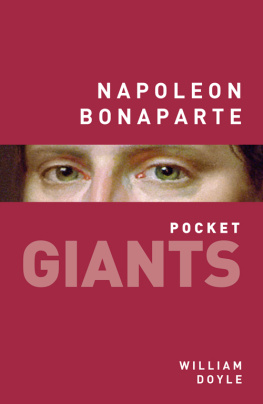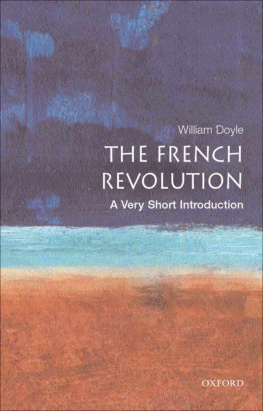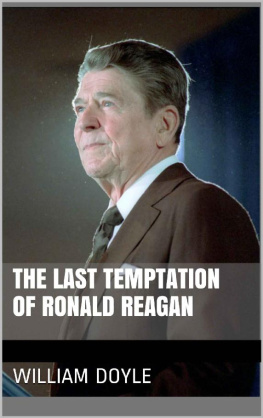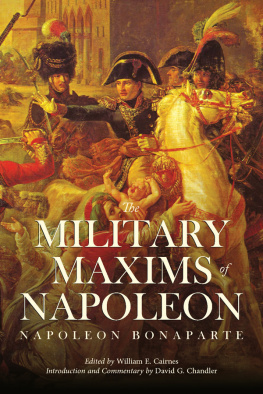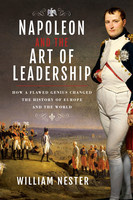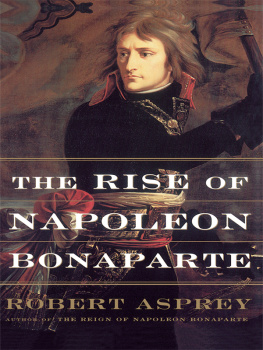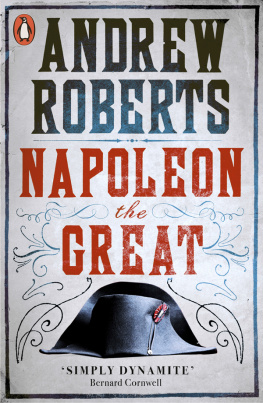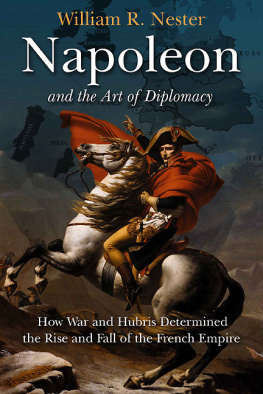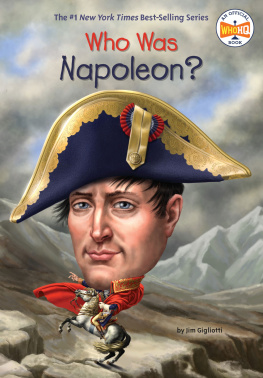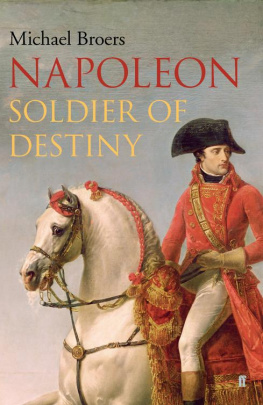Warmest thanks to Tony for suggesting, to Mike for reviewing, and to Christine for insisting .
Introduction
I am apart from everybody, I accept nobodys conditions.
Napoleon, 1806

From the earliest stages of the French Revolution there were predictions that it would end in the rule of a soldier. Everybody knew about Julius Caesar, who had destroyed the ancient Roman Republic, or Oliver Cromwell who had seized supreme power in the British Isles after the execution of Charles I. Nobody was sure who the usurping general might be. Until he defected to the enemy in 1792, the most likely figure seemed to be the Marquis de Lafayette, self-styled hero of two worlds who had served with George Washington in America and commanded the National Guard which policed the early Revolution. Then the threat seemed to come from Charles Dumouriez, who defeated Frances invading enemies and conquered Belgium in the winter of 179293. But he in turn defected, and by 1795 many eyes were on Charles Pichegru, who had led a successful French invasion of the Dutch Republic. Nobody gave a thought to a young Corsican artillery officer with an ambiguous political record who found himself defending the Republic that October, the revolutionary month of Vendmiaire, in command of troops who shot down royalist rebels in Paris.
So there was widespread incredulity when General Vendmiaire, as Napoleon Buonaparte was now derisively known, was appointed a few months later to command the Army of Italy. He had no field experience beyond commanding units of artillery. He was short, scruffy, sallow and spotty, and he spoke French with a strong Italianate accent. The senior staff of the Army of Italy were prepared to despise him. But, despite themselves, they came away from their first meeting curiously impressed. He exuded an air of confidence and command especially, as one said, when he put on the generals hat which would become his trademark. He promised to lead his small, neglected and undersupplied force over the Alps and into the most fertile plains on earth: Rich provinces, great towns will be within your power; there you will find honour, glory and riches.
Over the next year he proved as good as his word. In a series of brilliant marches and battles he defeated all Frances enemies in Italy, above all the power against which war had originally been declared in 1792: Austria. The Austrians signed peace preliminaries at Leoben in April 1797, with Napoleons army only a few days march from Vienna. Virtually unknown only two years earlier, he had won not just the Italian campaign, but the entire war on the continent. Thus he began to change the face of Europe several years before he took power in France.
He had done it without authorisation from Paris. Under the peace terms finalised at Campo Formio in October, former Austrian territories in Italy became the Cisalpine Republic in effect, the generals personal state. The Austrians were compensated with the territories of Venice, the oldest republic in Europe, now simply snuffed out. Some of the changes wrought by this newcomer on the international stage would prove transient, but after him Italy would never look or feel the same again. Redrawing boundaries that had been the work of centuries, the young general began to think of himself as a man of destiny. What I have done so far is nothing, he told an enquirer. His intention was to be as powerful in France as he now was in Italy: I declare to you that I can no longer obey; I have tasted command and I cannot give it up.
As yet, however, he thought the pear was not ripe, and until it was he had no interest in lasting peace. On returning to France, he was given command of an army to invade Great Britain, the Republics last remaining enemy. But he saw this as a dangerous trap and looked for a better opportunity to keep his military glory bright. Ever since his youth he had dreamt of emulating the exploits of Alexander the Great, and now he fixed his sights on Egypt. The government in Paris, the Directory, was only too glad to be rid of his threatening presence, and in the spring of 1798 allowed him to go, along with the flower of the French army and navy.
In strategic terms it was a disaster. Egypt was conquered swiftly enough, but the British navy destroyed the French fleet and left the invaders marooned. Meanwhile this unprovoked invasion of a territory of the Ottoman Empire led to a hostile diplomatic chain reaction, reigniting war in Europe. A new coalition of powers expelled the French from most of Italy and seemed poised to invade France itself. By the summer of 1799 the Republics government was plunged into crisis. Largely as a consequence of his own adventures in the east, the generals pear was now ripe. As soon as the bad news from Europe reached him, he ruthlessly abandoned his army and made a dash back to France.
Welcomed as the Republics one undefeated general, he was rapidly recruited to front a coup dtat aimed at replacing an unworkable constitution. When the coup was over he refused to be sidelined. He was appointed as one of three consuls to oversee the transition to a new regime, but his military prestige and the force of his personality overawed his two colleagues from the start. Under a new constitution promulgated as 1799 ended, Napoleon officially became the First Consul, invested with supreme power. A 30-year-old soldier was now the ruler of France.
Thus the nineteenth century began with triumph for Napoleon Bonaparte (now spelling his name the French way). His exploits would dominate its first fifteen years, and the memory of them would haunt the whole of it. He began by winning the war he had done so much to prolong, but which had carried him to power. Within two years, the Austrians, Russians and even the undefeated British had made peace. Simultaneously, the First Consul made peace with the Catholic Church, which had been at loggerheads with revolutionary France since 1790. He also began to lay institutional foundations which would reinforce the legacy of the Revolution in social and economic terms. Most of the country sighed with relief. If the representative institutions which the revolutionaries had tried to establish were now supplanted by an authoritarian government, it seemed a price worth paying for the return of order and stability.
The chief remaining uncertainty was that all this hinged on the life and energies of one man against whom extremists plotted several assassination attempts. Napoleon, and men whose careers now depended on his authority, concluded that the only way to perpetuate his achievements was through heredity. And so in 1804 he crowned himself a monarch, the Emperor Napoleon. One contemporary at least was disgusted. This was the moment at which Beethoven, who had dedicated his Eroica symphony to the hero of French republicanism, scratched out the dedication, declaring that he was nothing more than an ordinary man after all.
Napoleons empire soon embraced far more than France. He never expected the general peace of 1802 to last, nor did he desire it. Nothing, he told a close collaborator almost as soon as peace was concluded, can sound as loud as military success. A new-born government like ours needs to amaze and astonish. There was nothing Napoleon enjoyed more than fighting, and he looked forward to the moment when beaten enemies would give him an excuse to beat them again. He briefly dreamt meanwhile of re-establishing the former empire of sugar and slaves in the Caribbean, which had been blighted by revolutionary upheavals. A huge expedition sent to achieve this failed, but the results were still momentous: triumphant former slaves founded the black republic of Haiti, while the vast territory of Louisiana considered useless with few island plantations to supply was sold off to the United States. Giving up on an American empire was to have consequences far more significant, in world-historical terms, than all Napoleons imperial ambitions closer to home.

